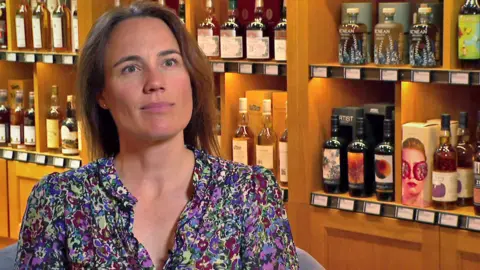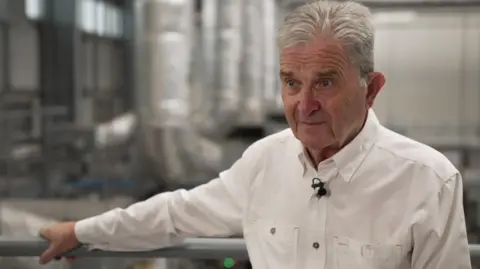The Office for National Statistics (ONS) said the UK’s dominant services sector – which covers businesses in sectors such as retail, hospitality and finance – was the biggest driver of growth in the first three months of the year.
But analysts warned growth was expected to slow in the months ahead, with Paul Dales at Capital Economics saying the latest figures “might be as good as it gets for the year”.
He said the strong rise in GDP was “unlikely to be repeated as a lot of it was due to activity being brought forward ahead of US tariffs and the rise in domestic businesses taxes”.
Mr Dales noted that export volumes in the first three months of the year increased by 3.5%, following three consecutive quarterly declines.
But Liz Martins, senior UK economist at HSBC, told the BBC’s Today programme she was “quite cheered” by the figures.
“Business investment is up nearly 6% on the quarter and the service sector is doing well as well.
“So it’s not just manufacturers selling to the US to get ahead of the tariffs.”

Annabel Thomas, chief executive of the Nc’nean Whisky Distillery based in Scotland, says she is “reasonably confident” about prospects for the UK.
UK interest rates are expected to fall further this year, “and that really affects the money people have in their pockets,” she says.
The business is growing in the US, and so decided to “absorb the tariffs and keep our prices stable in the US”.

John Inglis is the founder of diamond tool manufacturer Exactaform, which employs 100 people and has a factory in the US. He says making decisions over the business’s future has become very difficult.
“We’ve got tariffs. We don’t know which way we’re going – 10% off a margin is quite a lot.”
He says they are reluctant to move production to America as they would be “putting UK people who have been very loyal to us out of work”.
As for the rise in employers’ NI, he says he does not mind “putting in extra… but it’s all niggling away at the profit you need to expand”.
“We’re holding fire [on decisions] because if you make the wrong decision now, everybody’s out of a job.”
Last week, the Bank of England lowered UK interest rates to 4.25% from 4.5% and hinted more cuts could follow in the coming months.
But the stronger-than-expected growth figure has tempered the markets’ view on further interest rate cuts this year.
Analysts suggest potentially fewer reductions will come than previously expected and that has affected so-called swap rates, which hugely influence fixed-rate mortgage pricing.
Mortgage rates could now tick back up, although predictions are highly volatile. TSB has said it will increase its rates on Friday.